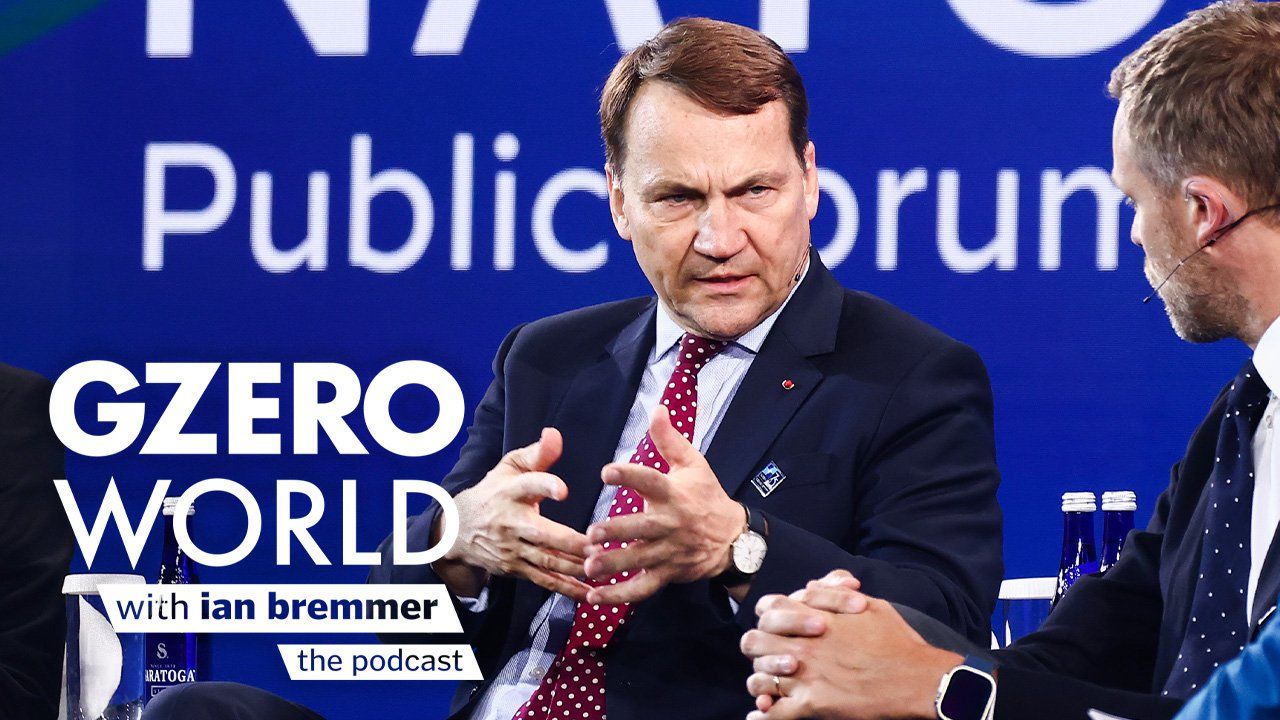GZERO World with Ian Bremmer Podcast
July 13, 2024
Listen: Does Ukraine have the strength, stamina, and support to win the war against Russia? On the GZERO World Podcast, Ian Bremmer sat down with Polish Foreign Minister Radek Sikorski on the sidelines of NATO’s 75th-anniversary summit in Washington, DC, for his perspective on the war, European unity, and whether NATO allies can remain united long enough to see Ukraine through to victory. Despite uncertainty about the 2024 US election, Ukraine’s struggle to recruit new troops, and rogue alliance member Hungarian Prime Minister Victor Orbán meeting with Putin, Sikorski is confident Ukraine will ultimately prevail.
Poland is an important part of that defense strategy. The country, which has a 300-mile border with Ukraine, contributes a larger percentage of its GDP to defense spending than any other NATO member, including the US, and has taken in almost a million Ukrainian refugees. Sikorski says that NATO is “back to basics” in its original mission of repelling and defending against an aggressive Russia and that Putin severely misjudged the strength of European and NATO unity in the lead-up to the invasion. Two and a half years into a bloody, brutal war with no end in sight, making sure that unity remains rock solid for as long as Ukraine needs is an urgent priority.
Subscribe to the GZERO World Podcast on Apple Podcasts, Spotify, or your preferred podcast platform, to receive new episodes as soon as they're published.
From Your Site Articles
- Ian Explains: Why Biden is the focus of the NATO Summit ›
- NATO Summit: Biden's uncertain future worries US allies ›
- Podcast: Why Putin will fail: former Finnish PM Alexander Stubb ›
- Is Ukraine running out of time? Former US ambassador Ivo Daalder sizes up the Russia-Ukraine war ›
- Czech president Petr Pavel: Ukraine war fatigue weakening NATO unity against Russia - GZERO Media ›
More For You
How is the US is reshaping global power dynamics, using tariffs and unilateral action to challenge the international order it once led? Michael Froman joins Ian Bremmer on GZERO World to discuss.
Most Popular
- YouTube
In this Quick Take from Munich, Ian Bremmer examines the state of the transatlantic alliance as the 62nd Munich Security Conference concludes.
- YouTube
At the 2026 Munich Security Conference, Brad Smith announces the launch of the Trusted Tech Alliance, a coalition of global technology leaders, including Microsoft, committing to secure cross-border tech flows, ethical governance, and stronger data protections.
When the US shift from defending the postwar rules-based order to challenging it, what kind of global system emerges? CFR President Michael Froman joins Ian Bremmer on the GZERO World Podcast to discuss the global order under Trump's second term.
© 2025 GZERO Media. All Rights Reserved | A Eurasia Group media company.
